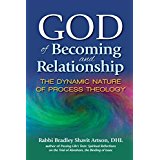Classical Western theology has held that God is “simple, eternal, unchanging, omnipotent, omniscient, and omnibenevolent”. But, as Artson writes, “This understanding of God has certain intolerable consequences.”
God’s omnipotence means that God is all-powerful. For God to be omnipotent implies there is no power that is not God’s – that means everything that happens is God’s responsibility. With this understanding of God, victims can feel they are sinful, abandoned, or punished; and, Artson writes, “a God who could have stopped “X” – but didn’t – is a God most of us want nothing to do with.” (see God of Becoming, p. 4)
God’s omniscience assumes that God knows everything, including the future as well as present and past. But for God to be all-knowing makes real freedom impossible; if God know the future absolutely, then there is no real freedom for God or for humans and other creatures.
God’s perfection means that God is eternally unchanging. But for God to be perfect and unchanging, God has to be beyond time and outside of space, untouched by events in creation, or affected by the choices we make.
In Chapter 1 Artson writes, “Torah and Midrashim portray a God who gets angry, who loves, who grieves, who gets frustrated and surprised, and who repents….”
“When the blessed Holy One recalls God’s children, who are plunged in suffering among the nations of the world, God lets fall two tears into the ocean, and the sound is heard from one end of the world to the other… (Berakhot 59a)
“This engaged, relating, interacting God is no surprise to Process thinkers (or to traditionally observant Jews, most of whom place religious practice – including text study – above more abstract theological reflection.” (God of Becoming, p. 6-7)
Text Study: If you re-read the book of Genesis now (after reading Artson), what kind of God would you find?
Reflecting with the Rabbis:
What do you think? Harold Kushner writes, “A God of power extorts obedience, but cannot command love. A God who could spare the life of a dying child, who could prevent the earthquake but chooses not to, may inspire our fear and our calculated obedience, but does not deserve our love.” (God of Becoming, p. 167)
What do you think? Artson writes, “Some theologians would rather deny their moral compass than change their theology. When confronted by moral outrage, they too often hide behind the term mystery. Or they assert that God’s definition of good and evil is different from ours. Rather than clinging to this outmoded (and unbiblical) idea of God and power, Process Thinking offers a way to understand God, world, and covenant in a way that can be integrated with contemporary scientific knowledge of cosmos and life.” (God of Becoming, p. 7)



In my opinion, God is all that is described as omniscient, omnipotent, omnipresent, ubiquitous, perfect. But we grow to understand God and God’s actions better and better as the ages pass. God may be static but our understanding is not static. One of God’s virtues is to be an agent of change. It is not God who makes mistakes; it is ourselves.
B’shalom, Jared